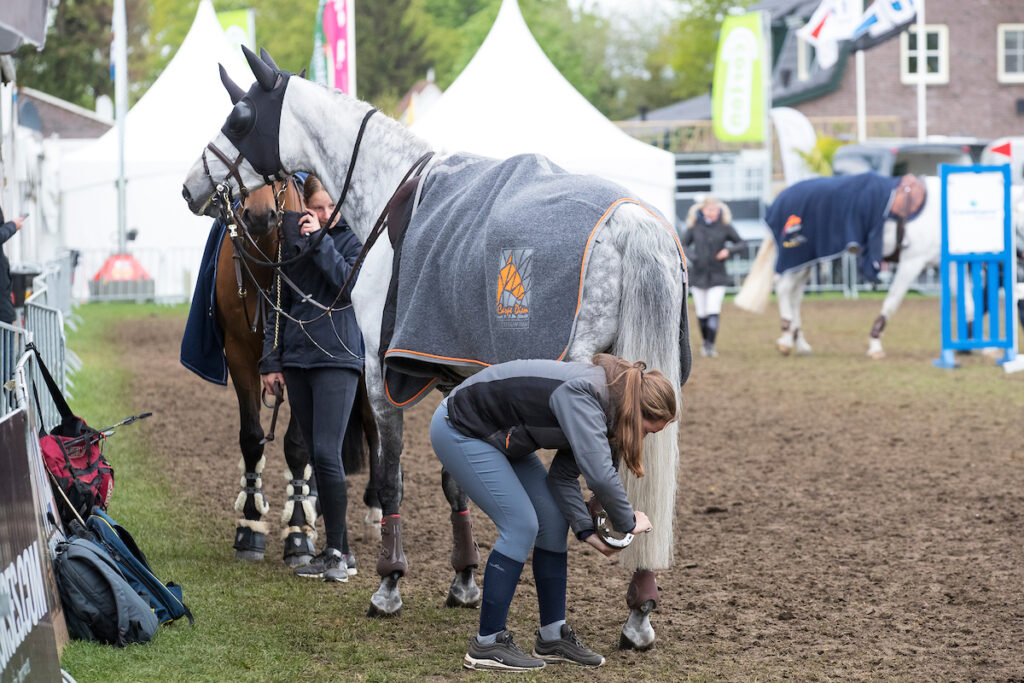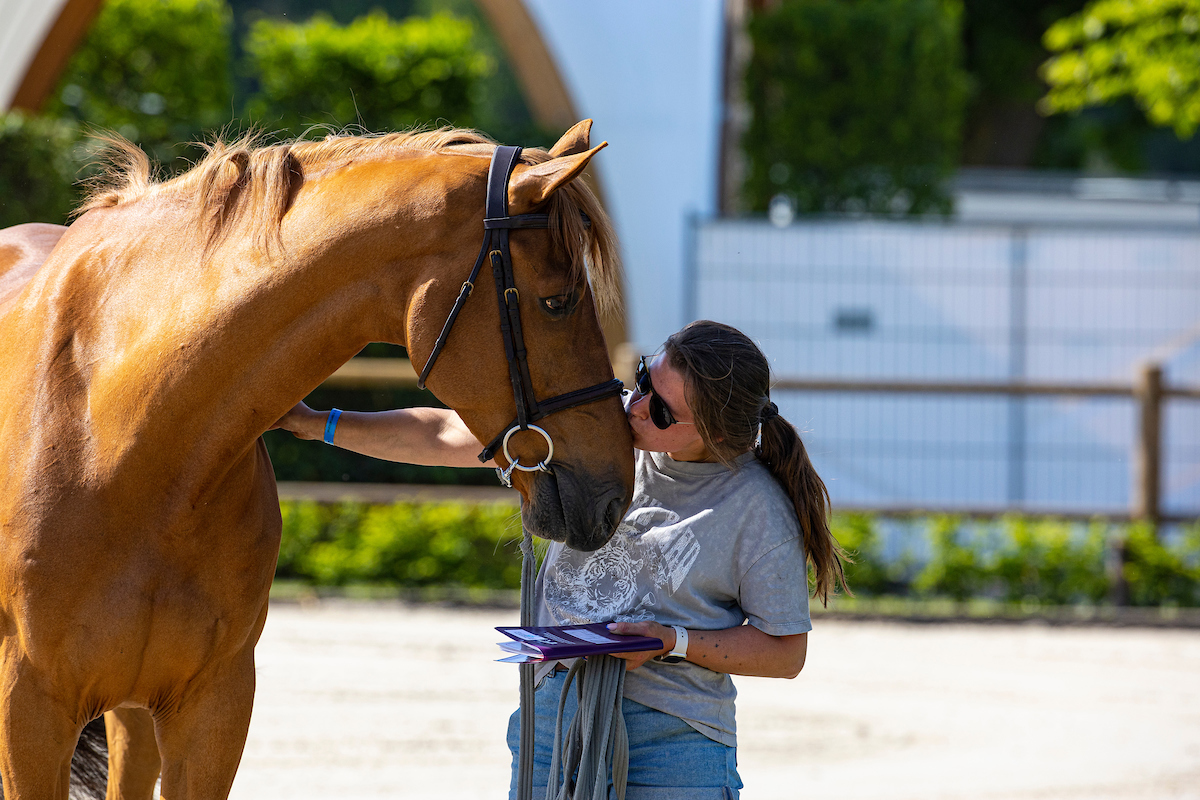Grooms have the dilemma of speaking up – or keeping silent
There are no trade standards for the grooming industry – no trade unions to back up complaints. As a result, McIvor has seen many examples of grooms putting up with substandard treatment.
“We just normally take it on the chin,” she said. “I don’t think there’s a lot of comeback. Grooms definitely are not going to have the money to pursue legal options.”
While there is a comeback in some circumstances of abuse, quite often grooms have nowhere to go with their stories – or do they? “There’s a very good page on social media,” said McIvor. “Grooms can report their employers on that page. I read through it every now and again. It gets updated, and it’s quite good, and it gives everybody a heads up on bad behavior from employers so they know to avoid that employer in the future.”
To stay or not to stay? That is the question
If a groom is not happy in their position and is being poorly treated, McIvor would advise them to cut their losses. “I would never encourage anybody to stay in a job if the boss is being horrible. It’s not worth it.” These words are said with the advantage of wisdom and experience. McIvor, herself, when younger, has endured challenging working environments. She was expected to sleep in the horsebox – the type of horse transport found in Europe. There was a bed, but no bedding. There was a kitchen but no water, nor food, plates, or cutlery. And there was no heating.
Questionable grooms’ accommodation is an ongoing concern. McIvor knows of a groom who worked for a wealthy employer and was expected to sleep in the back of a horse box [truck]. “There’s no heating, there’s no insulation, and there’s no privacy,” she said. “You expect grooms to sleep where you would essentially put your dog. I was just disgusted by the abuse of power and station. The way of thinking is that they’re nicer than you. Because the rider, in this case, the daughter of the employer, didn’t sleep in the back of the horse box. She had a lovely shower and a lovely bed.”
Different strokes for different folks
McIvor has witnessed some interesting arrangements for grooms, far from the norm for most people. “In some countries, they might think that it is okay for you to sleep with the horse at night at a horse show. That was done 40 or 50 years ago, but it’s not done anymore… normally.”

As recently as five years ago, at a World Cup show in Salzburg, Austria, McIvor was shocked to see that unconventional accommodation arrangements were still happening. “I was horrified to see that the people looking after the vaulting horses and the driving horses were sleeping on bales of hay outside the horses’ boxes,” she said. “And it wasn’t because of security, it was because no one had bought them a hotel room.”
McIvor recognizes that, unless grooms are prepared to speak up for themselves, such treatment is unlikely to change. “If you accept these things, then that becomes normal. It’s up to everybody to be responsible for themselves and how they’re treated.”
Breaking the silence
Abuse of power in terms of grooms and employers relies on the culture of silence. “You might have a hard time speaking up sometimes in situations,” said McIvor. She recalled having placed a groom with an employer and later discovered how badly the groom had been treated. “The employer made sure that the groom kept working. And if the groom wanted to have lunch, the employer stood in front of the fridge so she couldn’t get her lunch, or she would organize some trips for the horses to go use the aqua spa or something during lunchtime,” said McIvor.
It turned out that the employer in question was known elsewhere for the same maltreatment of her groom. “I saw one person on the groom’s social media group complaining that the boss had stood in front of the fridge. I said, can I just put my hand up and say, is her name such and such? And he said yes. And I was like, wow, that’s exactly what she did before.”
Defining what is normal
What may seem normal for one groom may seem unacceptable to another. With the more recent exchange of information among the grooming community with the advent of platforms like HorseGrooms and the social media page that McIvor discovered, it has become easier for a groom to evaluate whether or not they are being treated fairly.
Number of Horses at a Horse Show
“Often you’ll see people saying, is it normal to have ten horses or eight horses to care for at a show?” said McIvor. “No. Is it normal to have 15 horses to do by yourself at home? No. Other people will be saying, no, that’s not normal. It’s normal to have four horses, or it’s normal to have six or seven at times, but not every day. What’s normal is to have three horses at a horse show and four or five at home. You can do that very well, but you can’t do 15.”

The bottom line is that grooms, with rare exceptions, are fundamentally horse lovers, and even with hardships imposed on them, carrying out their job, they are likely to go the extra mile for the welfare of the animals in their care. McIvor has been in that position herself. “I had a horrific trip coming back from a show. I had to drive with horses on the wagon for a day and a half – 2000km on my own because I couldn’t get one back on the truck if I unloaded,” she said. “When I arrived, there was another driver to meet me and take the truck to another show immediately. It was an old truck, I couldn’t sleep in it. We arrived late at night, no place to sleep. I found a room somewhere at the equestrian center where the show was. There was a bed, but no bedding. I had to take the curtains from their poles to use as a blanket. That was the lowest point of my life.”
Footing the bill
McIvor has also experienced financial consequences from having an employer whose credit card did not work, leaving her with no choice but to pay out of pocket in order to make sure the horses got to the show.
“I’ve driven horses and I’ve paid for the fuel and everything on my own credit card, and my mortgage payment bounced out of my bank because the employer didn’t pay me back in time,” she said. “Can you imagine? I was leaving Spain and had to fill up with diesel at €500 at a time.”
This was not an isolated incident. McIvor found herself in a similar position not long ago. “That actually happened this year again with another employer,” she said. “I have a credit card and I had to use it, or we wouldn’t have been able to get to the horse show. I had to pay for my hotel room and the other groom’s hotel room, because he didn’t have two pennies to rub together.”
Enough is enough for McIvor. “That won’t be happening again,” she said. “Next time that happens, I’ll just down tools and I’ll just fly home. When you’ve got animals in your care, that’s how they have leverage on you.”
Grooms are not always blameless
The penny falls both ways, and grooms can also be the problem. When McIvor recently placed a groom with a client, she quickly learned that the posting had not been successful. “I wanted to know how they had got on,” she said. “And the report back was just dreadful, but I had to hear it.”
McIvor will not tolerate misrepresentation on either side. “I will never send that groom anywhere. They’ve shot themselves in the foot. One chance with me and you’re out. If you’re a groom or an employer,” she said.
Poor behavior from one groom has a knock-on effect on their co-workers. When McIvor was in her teens, she found out firsthand that there are grooms who know how to cut corners. “In the morning, we were all supposed to strap the horses,” she said, referencing the dying art of using a body brush and a curry comb to shine the coat and give the horse’s muscles stimulation at the same time. “There was a guy working with us who was kind of a lazy fellow,” she said. “I mucked out eight stables every morning. I did one complete line that was mine to do, and then strapped four horses. That boy used to go off and do farmwork, and I found out that he didn’t groom four horses, he just washed them in the box with hot water.”
A little goes a long way
Finding a good groom is not easy. Common sense would suggest that employers who are lucky enough to do so should go above and beyond to keep them. “It’s always better that you keep the groom that you have if they are good,” said McIvor. She advocates weekly communication where the groom is able to have a voice.

“Sit down with a coffee and a piece of cake on a Monday when it’s quiet,” she said. “Have a meeting where everybody gets together and where everybody can talk about how things can be improved and how everybody feels about their role or what they do or how things are managed. Grooms aren’t stupid. They have good ideas about what works and what doesn’t.”
If the environment does not lend itself to open communication, in that the employer is not willing to listen, McIvor has a suggestion. “If the groom is afraid to speak, they should be allowed to write it anonymously. Put it in a hat like a comment box. And then the boss has to read the comments every week,” she said.
When a job sounds too good to be true
For many grooms, traveling abroad to work can be an exciting prospect. Ads for jobs can make a situation sound enticing, but buyer beware, McIvor says. The reality may not always match the dream. Once again, she has had firsthand experience when working abroad in less-than-ideal conditions, with little freedom at all. “We had no time off,” she said. “The only day I got off was when a horse kicked me in the head.”
She stayed for over a year and, finally, did what she now advises others to do: she sat down and wrote a letter to her boss, outlining her concerns. “He looked at all the points I had made,” she said. “And it was just like ‘no’ to everything.” A week later, McIvor left.
Based on her experiences—good and bad—McIvor has some preventive measures in place to avoid ending up trapped in a bad grooming job. “I ask my employers to write a job description. I ask, what grooms do they have? How many people do they have for the work? So if there are 75 horses and they have five people, that is a red flag. Or I ask how long the groom who is being replaced has been there. If someone’s been there seven years, it’s obviously a decent job. But if they’re looking for a groom constantly, then there’s an issue.”
She also advocates doing homework – getting recommendations and or references from other grooms by asking around to see if anyone has worked for this employer before, and using the mentioned social media page. “You’ll get mixed reviews, and then you can make up your own mind,” she said.
If you are planning to travel abroad for a groom’s job, McIvor has some very simple, practical advice. “Always go on trial and always get the boss to pay your ticket,” she said. “So that way you’re not out of pocket and you’re not signed up to work with them forever. You’re just there for a week or two, and you can very easily make your mind up.”
Happy groom, happy horse show life
Keeping a groom happy is straightforward, according to McIvor. “Give them time off, pay them decently, bring them a coffee and a bun. Throw them 20 quid,” she said simply.
Small gestures go a long way when time is limited at a horse show. Having access to coffee depends on how close the grooms are to the vendors. McIvor recalls asking one employer whether he would mind bringing her a coffee and was told to “get it yourself”. She had a much better experience with an amateur rider who, on day one, asked her what she liked to drink and eat, and then had a coffee and brownies waiting for her on her grooming box at the barn every day. “That’s over 30 years ago,” said McIvor. “And to this day, that sits in my memory. The very fact that she spent a few dollars every day on looking after me.”
No room for regret
“I would cap it all off by saying the people that I love working for the best are the ones that can look me in the eye and treat me like a human,” said McIvor. “I’m very good at my job, like we all are. It doesn’t make you less human because you’re a groom.”
Looking back on her mixed bag of grooming experiences, good and bad, she says she would not change a thing. “It’s a wonderful life,” she said. “It’s the hard bits that make you at the end of the day. You have a better character and are a better person for it. I would do it all again.”
McIvor is taking her experience to several forums with a view to initiate positive change for grooms.
“It’s good that I can give back and hopefully make it nicer for the future,” she said. “The horses are amazing. Being in a position to look after such superstars is truly awe-inspiring. There is something really rewarding about it.”


